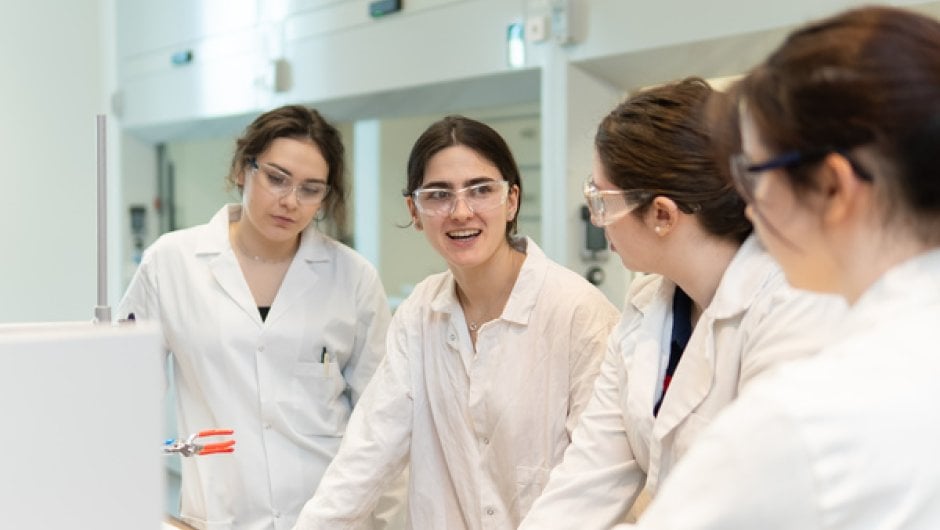As a food scientist you’ll apply scientific methods to solve challenges within our food system, including issues like affordability and sustainability. You’ll think about consumer and societal behaviour, as well as the fundamental chemical, biological, and physical aspects of food.
There are job opportunities for food science and nutrition graduates in sectors including manufacturing, retail, marketing, consumer research, food safety and regulation, policy development, research and development. You could also work as a nutritionist, helping the public or athletes with their diet and eating habits.
The market is healthy for new graduates, with 14% of the national workforce employed in the UK food and drink sector. You could also work towards Registered Scientist or Chartered Scientist (CSci) status.
The impact you could make
- Design ways to minimise waste for a large food manufacturer – using offcuts in recipes or composting leftover veg.
- Come up with a plan for local regenerative crop rotation that protects the soil.
- Develop a new way to keep food safely in jars without the need for preservatives.
- Design balanced meal plans for those struggling with food allergies or conditions like Crohn’s disease.
What you could study
- Quality and safety across the food chain
- New product development
- Sensory science
- Human nutrition
- Food chemistry and biochemistry
- Sustainable agriculture and ingredient sourcing
- Food microbiology
- Food processing
- Research techniques and final year project
Example module
Example project
Subjects it's useful to have studied first
Some food science and nutrition courses or apprenticeships will have requirements for previous qualifications in certain subjects. Entry requirements vary, so always check with the provider.
Chemistry
Biology
Physics
Maths
Food technology
Psychology
Hard skills you'll develop
- Analytical chemistry
- New product development
- Food processing and engineering
- Physiology and nutrition
Soft skills you'll develop
- Communication
- Research
- Problem-solving
- Research
- Innovation
Careers: Where it can take you
Find out more about your career prospects from studying food science and nutrition. The following information is based on a typical chemical scientist professional role.
Available jobs
Average salary
Career options
Food science and nutrition
Food scientist
Food technologist
Nutritionist
Brewer
Health and safety

What is an… animal nutritionist?
You may be able to guess, but an animal nutritionist works with animals to research which is the best diet for them, according to things like their weight, overall health, and food they’d eat in the wild. You’ll work in a zoo, vets, or animal rescue centre, and it probably helps if you love animals! You could also develop new recipes that provide great nutrition for a particular breed or species of animal.
Find your ideal career
Take our careers quiz to find your ideal job matched to your personality type.Getting in: Entry requirements
Find out more about what you'll need to study food science and nutrition at university or as an apprenticeship.
Average requirements for undergraduate degrees
Entry requirements differ between university and course, but this should give you a guide to what is usually expected from food science and nutrition applicants.
A levels
Scottish Highers
Vocational

Health and science apprenticeships
Check out our industry guide to help you decide if a health and science apprenticeship might be right for you.Let's talk about... science apprenticeships (Sponsored by Manchester Metropolitan University)
Listen to our brand new podcast all about degree apprenticeships in science. Find out about funding, what day-to-day life is like, making friends, and more from our expert panel.
Considering an apprenticeship?
Applying for an apprenticeship is just like applying for a normal job. Here’s what you need to know:-
1
Deadline
Apprenticeships don't follow the same deadlines as applying to uni, the deadline is down to the employer. -
2
Where to apply
You apply directly through the employer. -
3
No limits
You're not restricted to one apprenticeship application; you can do as many as you like. -
4
Apply to university and apprenticeships
There's nothing stopping you applying to university through UCAS, while also applying for apprenticeship vacancies. -
5
Find out more

Apprenticeship vacancies
Check out live apprenticeship vacancies in health and science.Explore further
Go deeper into topics around food science and nutrition with the following:-
1
Institute of Food Science and Technology
Follow the IFST on YouTube to find videos on all aspects of food science, from detecting pathogens in milk to research on the health benefits of polyphenols. -
2
Food Matters Live podcast
Listen to this podcast on all aspects of food, science and nutrition research, policy and innovation, with episodes on topics like sustainability, so-called ‘super foods’ and fortifying our food and drink. -
3
Tasty Careers
Use this website to find out more about potential careers in the food and drink industry. -
4
Food Unwrapped
This fun show on Channel 4 uncovers the secrets behind how all your favourite foods are produced.
76% of students
82% of students
Application advice
Whether it's personal statement tips or what to write in a cover letter for an apprenticeship application, our advice will help you get ahead in your food science and nutrition journey.Skills, experiences, and interests to mention
- Try and get across your interest for the subject, through talking about things you’ve seen or read, or experiments you’ve done at school or home that sparked your interest.
- You’ll likely work in a lab or research facility so try and do some shadowing or work experience if you can, whether in a local factory, pharmacy, or hospital lab, or mention lab work you’ve done at school and what you learned.
- How do you solve problems? Whether you’re into Maths, science, or Rubik’s cubes, can you give an example of something complex you’ve solved?
- Show you’re a good team worker too, through projects you’ve done, or extracurricular activities like sport, Scouts, or even going travelling as a group.
- Where do you see yourself working after studying? Show you understand the industry and the types of jobs you could do. Mention a specific area like environmental protection or creating affordable new foods if there’s something you’d like to focus on.

Personal statement guide
We asked admissions tutors to share their dos and don'ts for writing a strong and engaging food science and nutrition personal statement. Here's what they told us.












